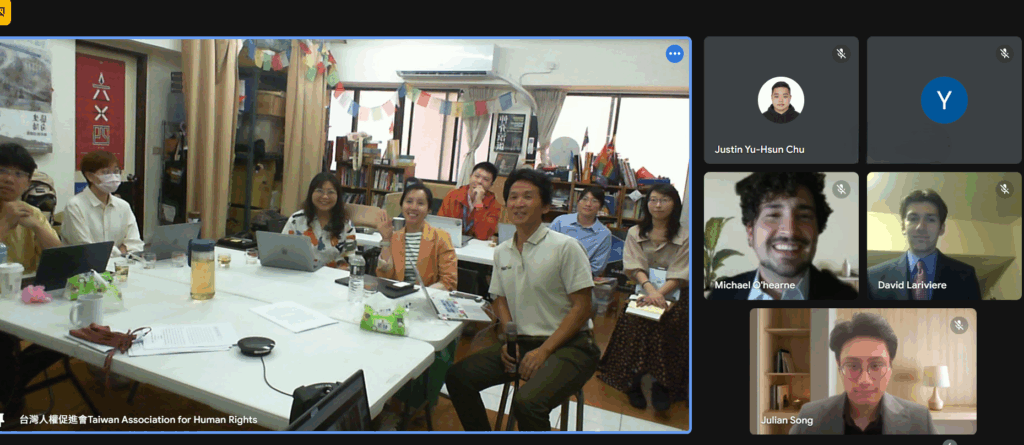Date: October 27, 2023 (Friday), 1:30 PM – 4:30 PM
Location: National Assembly Members’ Hall, Room 8, South Korea
Co-hosts: National Human Rights Commission of Korea, 4.16 Foundation, Bereaved Families of the 10.29 Itaewon Tragedy, Civil Measures Committee for the 10.29 Itaewon Tragedy, and National Assembly members Kwon In-sook, Kang Eun-mi, and Yong Hye-in.
Support: Community Chest of Korea
Moderator: Yeom Hyung-guk (Director, Anti-Discrimination Bureau, National Human Rights Commission)
Panelists:
- Jo In-young (Attorney, Public Interest and Human Rights Foundation, Gonggam)
- Kim Eon-kyung (Director, Media Research Institute Munkle)
- Song Hae-jin (Bereaved family member of the 10.29 Itaewon Tragedy)
- Park Sung-hyun (Team Leader, 4.16 Foundation)
- Oh Kyoungmi (a.k.a. Kimmy) (Researcher, Open Net)
- Lee Seung-woo (Officer, Ministry of Interior and Safety)
- Lee Byeong-gui (Director, Cybercrime Investigation Division, National Police Agency)
- Kim Ki-ho (Digital Harm Information Officer, Korea Communications Commission)
On October 27, 2023, a forum titled “Discussion Forum on Addressing Hate and Discrimination: The Right to Safety from Disasters and Hate Speech” was held at the National Assembly Members’ Hall, Room 8. This event was co-hosted by several organizations, including the National Human Rights Commission, the 4.16 Foundation, and committees related to the Itaewon tragedy, along with three National Assembly members.
The discussion highlighted strategies for combating hate speech and ensuring safety in the context of disasters. Oh Kyoungmi (a.k.a. Kimmy) from Open Net shared the organization’s views and ongoing efforts in countering hate speech. The event included diverse perspectives from legal, media, and policy experts, alongside representatives from bereaved families and government agencies. Here are the summaries of her presentation and the panel debate:
Addressing Hate Speech: Legal Frameworks, Social Solidarity, Education, and Technology
By Oh Kyoungmi
In a recent discussion on combating hate speech, Open Net emphasized the importance of balanced approaches to address this pressing issue. My presentation will be highlighting the necessity of enacting anti-discrimination laws, fostering social solidarity, promoting public education, and leveraging technology to effectively counteract hate speech.
The Challenge of Regulating Hate Speech
The core debate revolves around defining and regulating hate speech—determining who should regulate it, how, and on what basis. Open Net advocates for proportional regulation rather than banning all expressions of criticism or emotional statements. Korea currently relies on laws such as the National Security Law and defamation statutes to enforce strong restrictions on speech. However, there are no specific laws targeting hate speech or expressions inciting discrimination. Instead, Korea’s legal framework often substitutes hate speech regulation with broad applications of defamation and insult laws, which can be problematic due to their subjectivity and potential misuse.
The Limitations of Existing Laws
Insult laws, in particular, present issues as their broad scope leads to inconsistent applications. For example, an innocuous remark may be interpreted differently depending on the context or recipient. This subjectivity complicates enforcement and risks misuse by authorities to shield themselves from criticism. Major international human rights organizations, such as the UN Human Rights Committee, have recommended abolishing criminal penalties for defamation or insults, emphasizing the importance of protecting freedom of expression under international treaties.
The Need for an Anti-Discrimination Law
While international standards, such as Article 20 of the International Covenant on Civil and Political Rights, prohibit incitement to discrimination based on race, religion, or nationality, Korea lacks a comprehensive anti-discrimination law. The National Human Rights Commission of Korea has proposed defining hate speech as expressions that insult or demean individuals based on characteristics such as gender, disability, or sexual orientation. Enacting anti-discrimination legislation would provide a solid foundation for addressing hate speech without infringing on freedom of expression.
For instance, Korea’s Disability Discrimination Act prohibits discriminatory expressions targeting individuals with disabilities and allows for civil remedies rather than criminal penalties. Expanding such legislation across societal domains could effectively address hate speech while minimizing conflicts with free expression.
Addressing Ambiguous Cases and Promoting Positive Responses
Not all hate speech can or should be regulated through legal means. Expressions that fall into a gray area require alternative approaches to avoid overregulation and potential infringements on freedoms. Oh proposed two key solutions:
- Social Solidarity and Counter-Speech: Encouraging positive counter-speech and public education can combat hate speech more effectively than criminal penalties. Drawing from Open Net’s initiatives, including a 2021 forum on counter-speech, evidence shows that positive engagement on social media can drown out hate speech and create ripple effects, encouraging others to join constructive dialogues. When authoritative or high-profile figures participate, the impact is even greater.
- Technological Solutions: Platforms play a crucial role in the proliferation of hate speech. By collaborating with international civil society organizations, platforms can be encouraged to suppress hate speech voluntarily through algorithmic changes. As private entities, platforms can moderate content that falls outside the scope of legally defined hate speech without violating international human rights standards.
Panel Debate Highlights
The forum also featured insights from other speakers who discussed hate speech targeting disaster victims, such as those affected by the Itaewon tragedy. Legal experts and bereaved family members called for increased awareness of victims’ rights and emphasized the importance of preventing hate speech during times of national crises.
Panelists noted the absence of specific legislation targeting online hate speech and recommended new regulatory frameworks that balance self-regulation with government oversight. Suggestions included enhancing media reporting standards, strengthening platform accountability, and establishing monitoring systems supported by government resources.
Conclusion
The discussion underscored the urgent need for Korea to enact anti-discrimination laws, foster social solidarity, and employ education and technology in addressing hate speech. While legal measures are crucial for regulating overtly harmful expressions, nuanced approaches are essential to respect and protect freedom of expression. By combining legislative action, community-driven efforts, and technological innovation, society can build a more inclusive and respectful environment.


0 Comments